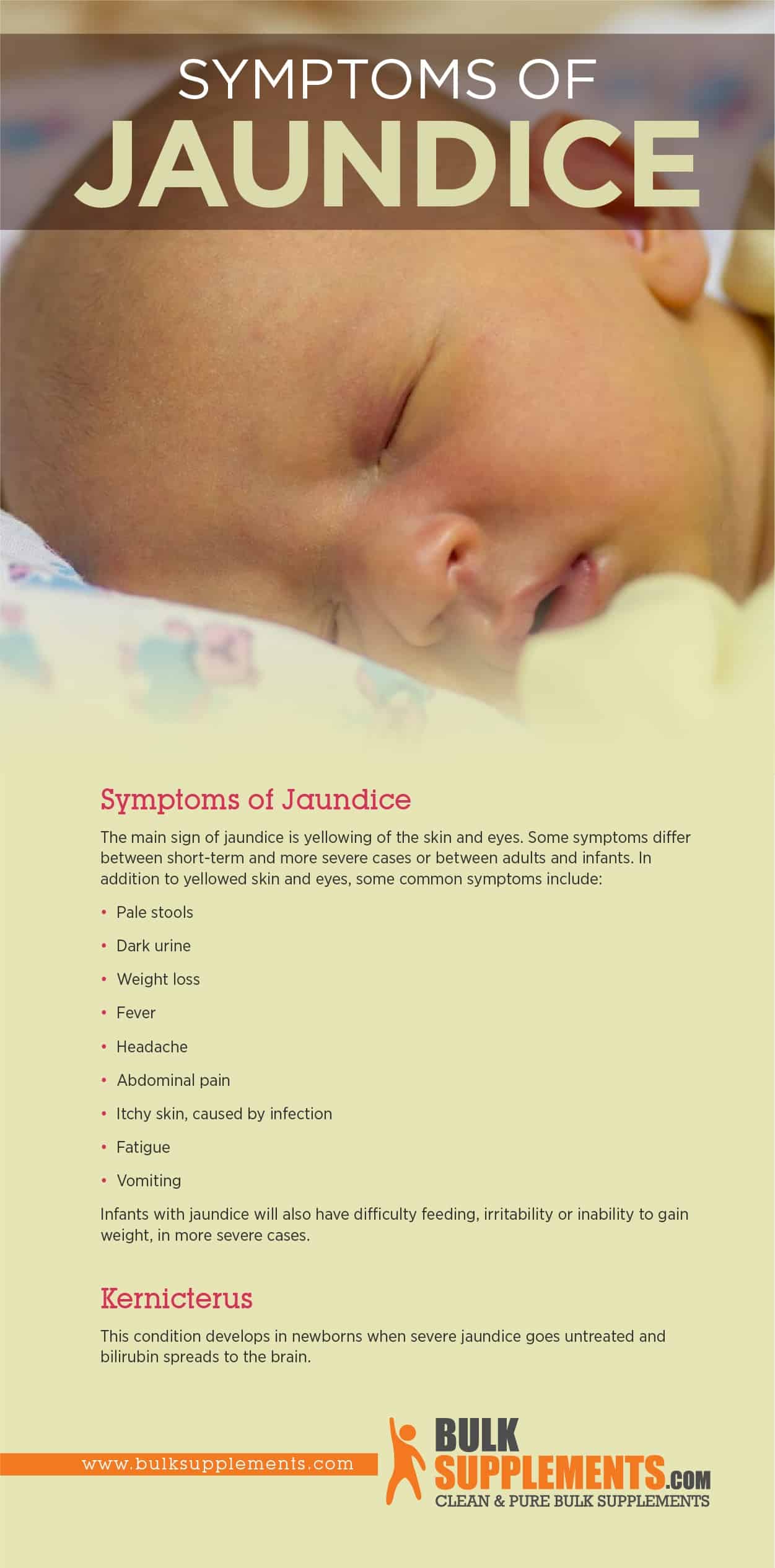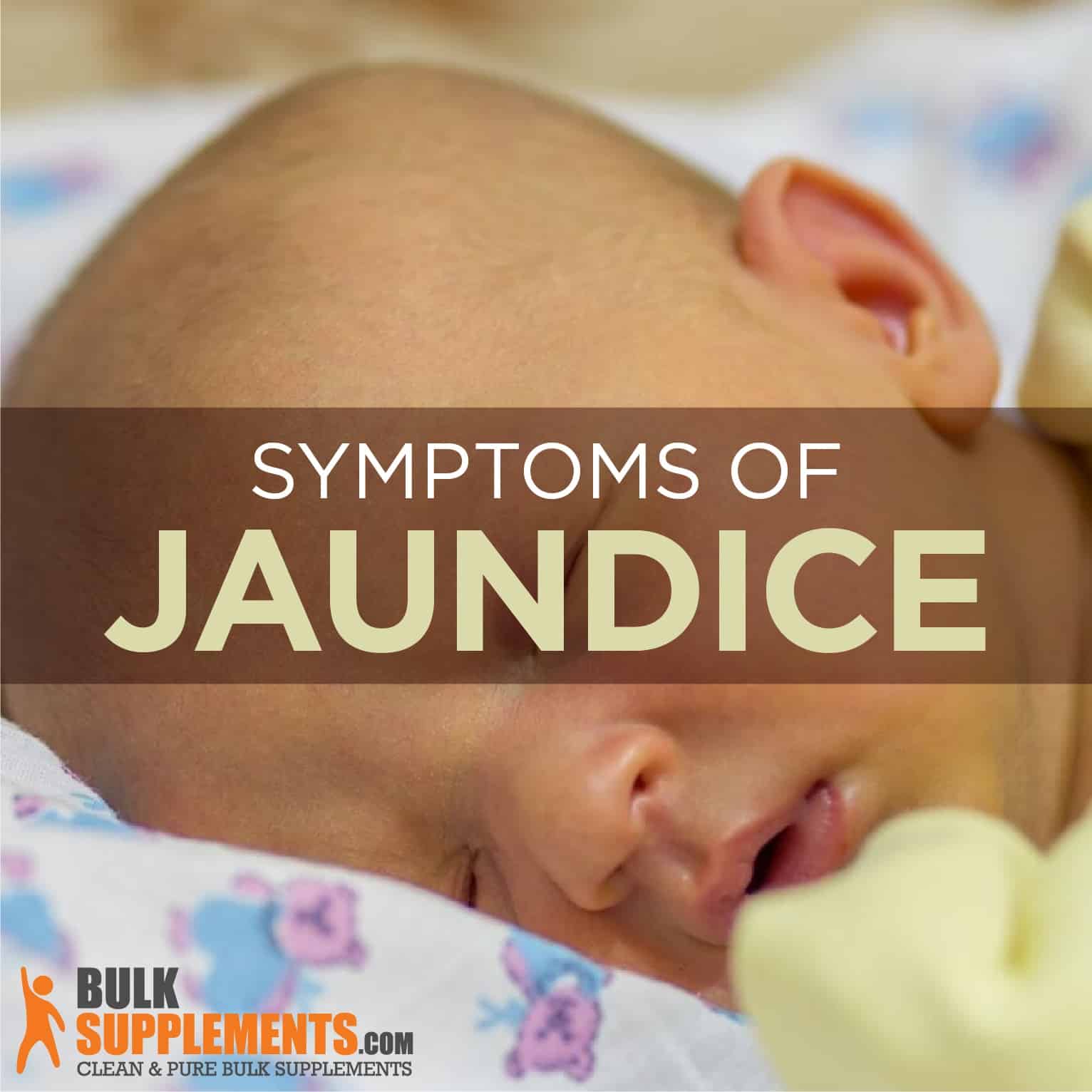What is Jaundice?
Jaundice is a health condition in which your skin, the whites of your eyes and mucous membranes turn yellow from high bilirubin levels in the blood. Your body fluids may also turn yellow. Bilirubin is a yellow pigment that builds up in your blood when the liver cannot break down the body’s old red blood cells. (x)
Jaundice is very common in premature babies, affecting males more often than females. Approximately 60 percent of infants have jaundice and although it isn’t as common, it can also develop in adults. (x)
Causes of Jaundice in Infants
Knowing the causes of jaundice in infants helps you as a parent understand the process of helping your baby become healthy again. The process is simple, and in a matter of time, all will be well. Some causes include:
Physiological Jaundice
In the womb, the mother’s liver removes bilirubin from the baby’s blood, but sometimes the bilirubin builds up in the baby’s liver when it doesn’t develop enough to do it on its own. (x) This form of jaundice is the most common, developing within the first few days after birth and resolving as the baby’s liver matures. (x) (x) (x) Causes of jaundice in newborns include:
- Breast Milk
Breastfed newborns can develop jaundice from certain chemicals in breast milk, preventing the liver from excreting bilirubin effectively. This condition is harmless and resolves on its own over 3-12 weeks. (x)
- Premature Birth
Babies born prematurely may have underdeveloped organs and have even more difficulty removing bilirubin from their bodies than full-term babies, resulting in jaundice. (x)
- Mismatched Blood Type
Mismatched blood type is a rare cause of jaundice in newborns. But if your baby has a different blood type than you as the mother, the antibodies in your body will start to attack the baby’s red blood cells. (x)
- Cephalohematoma
If doctors use tools during your delivery, it can break the blood vessels under the baby’s scalp. If the blood builds up beneath the skin, an increase in bilirubin may happen and increase the risk of jaundice. Cephalohematoma occurs in 1 to 2 percent of all live births. (x) (x)
Causes of Jaundice in Adults
While jaundice is common in newborn babies, the symptoms are even rarer in adults and can signal another underlying health condition interfering with normal bilirubin metabolism and excretion. Some of those causes include: (x)
- Hepatitis
Caused by viruses, toxins, infections, severe blood loss and alcohol, hepatitis is inflammation that can damage the liver over time, leading to jaundice. Acute viral hepatitis is a common cause of jaundice in young and healthy individuals. (x)
- Alcoholic Liver Disease
Jaundice can also develop from alcohol-related liver problems, such as alcoholic cirrhosis and alcoholic hepatitis. Heavy alcohol consumption leads to inflammation in the liver. (x) (x)
- Blocked Bile Ducts
Bile ducts are thin tubes that transport bile from the liver to the small intestine. Cancer, rare liver diseases and gallstones can cause blockage and bilirubin build-up in the blood, resulting in jaundice. (x)
- Pancreatic Cancer
Statistics suggest that pancreatic cancer is the tenth most common type of cancer in men and the ninth most common in women. (x) Jaundice is often one of the earliest symptoms of pancreatic cancer and results when cancer begins to spread to the liver. Pancreatic cancer is one cause of blocked bile duct, which prevents the liver from removing bilirubin and secreting bile properly. (x) (x) (x)
- Medications
Although many different drugs can affect liver function, only a few can cause enough damage to result in jaundice. Penicillin, (x) birth control, (x) and steroids (x) can cause damage to the liver. Specifically, acetaminophen poisoning is one common cause of medicinal liver damage. (x) (x)
- Hemolytic Anemia
Jaundice is one symptom of hemolytic anemia, in which the body destroys red blood cells but cannot replace them fast enough. It decreases the number of red blood cells in circulation, increasing indirect bilirubin. This form of anemia can sometimes occur in newborns because of mismatched blood types between the baby and its mother. Other times patients acquire it from other factors. (x) (x)
Other Causes of Jaundice
The following list of causes is rarer than the ones above, which are the primary reasons you or your infant might have jaundice. The list below you will notice have similar factors that cause the health concern:
- Dubin-Johnson Syndrome
A rare and inherited form of chronic jaundice, Dubin-Johnson syndrome usually affects adolescents and young adults, but sometimes it can affect newborns. A genetic mutation that causes bilirubin to build-up is the reason. Jaundice is usually the only feature of Dubin-Johnson syndrome. (x)
- Crigler-Najjar Syndrome
Also caused by a gene mutation, Crigler-Najjar syndrome affects the enzyme that processes bilirubin to create increased build-up of bilirubin and thus jaundice. (x)
- Pseudojaundice
Pseudojaundice is harmless. In this case, the skin yellows not because of excess bilirubin but because of other factors, such as Addison’s disease, (x) anorexia, spray tanning products or excess beta-carotene levels from eating large amounts of melon, carrots and pumpkins. (x)

Symptoms of Jaundice
The major sign of jaundice is yellowing of the skin and eyes. Some symptoms differ between short-term and more severe cases or between adults and infants. In addition to yellow skin and eyes, some common symptoms include: (x)
- Pale stools
- Dark urine
- Weight loss
- Fever
- Headache
- Abdominal pain
- Itchy skin caused by infection
- Fatigue
- Vomiting
In more severe cases, infants with jaundice will also have difficulty feeding, irritability, or inability to gain weight. (x) (x)
Kernicterus
This condition develops in newborns when severe jaundice goes untreated, and bilirubin spreads to the brain. Doctors consider this a serious condition because it causes brain damage — central nervous system. (x) (x) (x)
Diagnosing Jaundice
Besides the apparent yellowing of your body, the doctor will ask about the patient’s symptoms and health history before performing other exams when diagnosing jaundice. (x)
Blood Tests
- Complete blood count (CBC) – measures the components of the blood, including platelet levels, white blood cells and red blood cells (x)
- Bilirubin blood test – measures bilirubin levels (x)
- Imaging Tests
- Ultrasound – uses sound waves to observe the pancreas, gallbladder and liver (x)
- Computerized tomography (CT) scan – shows pictures of different areas of the body to find abnormalities in the pancreas or the liver (x)
- Magnetic resonance imaging (MRI) – provides a detailed visual of the bile ducts (x)
Treatment for Jaundice
If your condition is mild, it may resolve itself. Adult cases rarely require treatment, but infant cases can be more severe. Treatment usually aims to ease the cause of the condition rather than just the symptoms by: (x) (x)
- Feeding infants more often to produce more waste and flush the bilirubin
- Pumping, rather than breastfeeding, breast milk
- Phototherapy
- Blood tests
- Blood transfusion
- Boosting iron
- Antiviral or steroid medications for hepatitis
- Removing any obstructions
- Changing or avoiding certain medications
Supplements for Jaundice
Research shows that supplementing your body helps it become healthy and remain healthy as long as you continue to live a relatively healthy lifestyle by eating the proper foods and exercising regularly. When you experience a health concern, supplementing your body is an intelligent choice, but discuss it with your healthcare provider. It would help if you were sure there are no adverse reactions to the new supplements. Nutritional supplements for jaundice include:
Vitamin B2 can treat neonatal jaundice. Riboflavin is a light-sensitive vitamin used in phototherapy or blue-light treatment for newborns. A study determined the vitamin B2 enhanced the effectiveness of the blue-light treatment. (x)
Yellowing of the skin can also stem from Vitamin B12 deficiency. Increasing Vitamin B12 intake could be the simplest solution to reduce the appearance of jaundice. (x)
Research has linked low levels of Vitamin D to the progression of certain liver diseases and, as a result, jaundice. Keeping stable levels of Vitamin D can help control the symptoms of liver problems, including yellowish skin. (x)
Also known as holy thistle, milk thistle is a natural antioxidant with anti-inflammatory qualities. It helps to ease jaundice symptoms since the extract helps treat liver disease. (x) For centuries, it appears to be safe by motivating the liver to function better. (x) Milk thistle also benefits other organs of your body. (x)
Where to Buy Supplements for Jaundice?
You can purchase these supplements for jaundice at BulkSupplements.com. The company is an industry-leading manufacturer and distributor of pure dietary supplements.
BulkSupplements.com is not just a consumer brand. It also supplies pure ingredients to other food and supplement brands to make their products. All products at BulkSupplements.com are manufactured and tested according to current and proper manufacturing practices.
Are you interested in trying any of these powders or supplements mentioned in this article as a possible solution to helping you with jaundice or liver health? Contact BulkSupplements.com to place an order today.
The Bottom Line
Jaundice is a health condition characterized by yellowed skin and eyes resulting from bilirubin build-up in the skin and mucous membranes. Jaundice is most common in newborns, especially in breastfed, underweight or preterm infants. It develops within the first week of birth and usually disappears within one or two more weeks.
When you see someone with yellow eyes and skin it is sort of haunting. It’s obvious there is a health concern. Jaundice treatment in adults depends on the underlying trigger or condition, whether it requires medication or surgery. In conjunction with treatment, supplements effectively supply nutrients and boost overall health.
These statements have not been evaluated by the Food and Drug Administration. These products are not intended to diagnose, treat, cure or prevent any disease.


